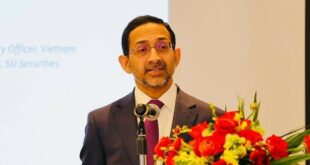Private investors are showing more interest in building expressways after a long thaw, with experts calling for greater support from the government and relevant localities.
Vietnam’s biggest conglomerate Vingroup and largest private lender Techcombank have been given the green light to conduct a pre-feasibility study on the Gia Nghia – Chon Thanh expressway.
The consortium will have to submit its report by Aug. 31, according to the Ministry of Transport (MoT).
Once the report is appraised and approved, the MoT will start a bid to select investors for the expressway, with Vingroup-Techcombank able to participate in the process should they want to.
The expressway will stretch 212 kilometers with four-six lanes and a maximum speed of 80-100 kph. It will connect Central Highland Dak Nong and southern Binh Phuoc provinces.
Another consortium, led by Deo Ca Corporation, has proposed to invest in two expressway projects in the north, Dong Dang – Tra Linh and Huu Nghi – Lang Son.
 |
|
Workers construct the 98-kilometers Cam Lo – La Son expressway connecting central Quang Tri and Thua Thien Hue provinces, February 2021. Photo by VnExpress/Vo Thanh |
It commits to raise VND2.7 trillion for the project.
The 115-kilometer Dong Dang – Tra Linh expressway will connect Lang Son and Cao Bang provinces, while the 43-kilometer Huu Nghi – Chi Lang will run from Lang Son to the border with China.
First-phase investment for the former is expected to be VND13.2 trillion, and for the latter, VND7.61 trillion. They have yet to attract investors, and have been delayed due to low traffic volume and shortage of capital.
In early May, the Civil Engineering Construction Corporation No. 6 (CIENCO 6), together with Coteccons Construction, Thuan Viet Construction & Investment, and Tan Thanh Holdings Investment, had notified the MoT about their interest in investing in the Bien Hoa – Vung Tau expressway.
The government has approved the project’s pre-feasible report, with first-phase investment of VND17.83 trillion. However, it later proposed to shift the investment model from public-private partnership (PPP) to public investment.
The change would shorten the project’s completion time to 2025 rather than 2026, as the bidding process under the PPP model would not finish until March 2024, the MoT said.
Tran Chung, chairman of the Vietnamese Association of Road Systems Investors, said it is a good sign that many private companies are seeking to invest in expressways.
Those projects were not able to attract private investors, as they only funded three out of eight expressways between 2017 and 2020.
The current PPP Law includes clarified rights and obligations pertaining to related parties, but there is a remaining bottleneck: the state’s capital contribution needs to be lower than 50 percent of total investment.
Investors of projects in remote areas will be discouraged due to this regulation, he said. Those projects will have low traffic volume and a long payback period, so it is necessary for the government to raise financial aid toward these.
Investors are further concerned over the risk- and profit-sharing mechanism, with the government and localities required to commit to disbursing capital and clearing construction sites on schedule.
- Reduce Hair Loss with PURA D’OR Gold Label Shampoo
- Castor Oil Has Made a “Huge” Difference With Hair and Brow Growth
- Excessive hair loss in men: Signs of illness that cannot be subjective
- Dịch Vụ SEO Website ở Los Angeles, CA: đưa trang web doanh nghiệp bạn lên top Google
- Nails Salon Sierra Madre
 VnExpress News The News Gateway of Vietnam
VnExpress News The News Gateway of Vietnam




